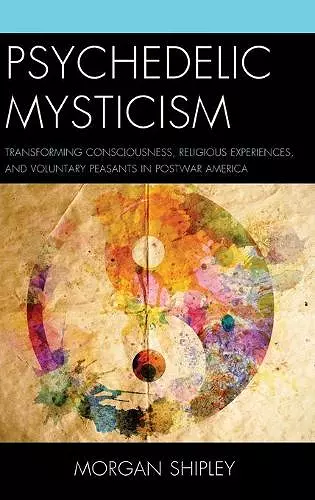Psychedelic Mysticism
Transforming Consciousness, Religious Experiences, and Voluntary Peasants in Postwar America
Format:Hardback
Publisher:Bloomsbury Publishing PLC
Published:12th Nov '15
Currently unavailable, and unfortunately no date known when it will be back

Concerned with scholarly, popular, and religious backdrops that understand the connection between psychedelics and mystical experiences to be devoid of moral concerns and ethical dimensions—a position supported empirically by the rise of acid fascism and psychedelic cults by the late 1960s—Psychedelic Mysticism: Transforming Consciousness, Religious Experiences, and Voluntary Peasants in Postwar America traces the development of sixties psychedelic mysticism from the deconditioned mind and perennial philosophy of Aldous Huxley, to the sacramental ethics of Timothy Leary, Richard Alpert, and Ralph Metzner, to the altruistic religiosity practiced by Stephen Gaskin and The Farm. Building directly off the pioneering psychedelic writing of Huxley, these psychedelic mystics understood the height of psychedelic consciousness as an existential awareness of unitive oneness, a position that offered worldly alternatives to the maladies associated with the postwar moment (e.g., vapid consumerism and materialism, lifeless conformity, unremitting racism, heightened militarism). In opening a doorway to a common world, Morgan Shipley locates how psychedelics challenged the coherency of Western modernity by fundamentally reorienting postwar society away from neoliberal ideologies and toward a sacred understanding of reality defined by mutual coexistence and responsible interdependence.
In 1960s America, psychedelics catalyzed a religious awakening defined by compassion, expressed through altruism, and actualized in projects that sought to ameliorate the conditions of the least advantaged among us. In the exact moments that historians and cultural critics often locate as signaling the death knell of the counterculture, Gaskin and The Farm emerged, not as a response to the perceived failures of the hippies, nor as an alternative to sixties politicos, but in an effort to fulfill the religious obligation to help teach the world how to live more harmoniously. Today, as we continue to confront issues of socioeconomic inequality, entrenched differences, widespread violence, and the limits of religious pluralism, Psychedelic Mysticism serves as a timely reminder of how religion in America can operate as a tool for destabilization and as a means to actively reimagine the very basis of how people relate—such a legacy can aid in our own efforts to build a more peaceful, sustainable, and compassionate world.
In this fascinating and wide-ranging text, Morgan Shipley notes that in our culture, the use of psychedelics (especially in the 1960s) is often associated with a type of hedonistic and narcissistic turning inwards, a drug-induced pseudo-mysticism that deflected energy from the political and social activism of the time. Shipley suggests that while “acid casualties” did exist, and are what stand out in our collective memory of that time period, in actuality, psychedelics often served as a catalyst for a genuine religious awakening, on both an individual and cultural level.
Shipley does an excellent job of recovering the all-too-often overlooked mystical dimensions of the use of psychedelics, particularly in the 1960s. In addition, his suggestion that the mystical insights that are frequently catalyzed by psychedelics can often lead to ethically and spiritually transformed lives is thoughtful and provocative.
Morgan Shipley’s new book, Psychedelic Mysticism: Transforming Consciousness, Religious Experiences, and Voluntary Peasants in Postwar America, is going to prove quite helpful in my attempt to persuade my students to take seriously the connections between psychedelic drugs, religious awakenings, and countercultural ways of living during the 1960s. The goal of the book, according to Shipley, is “to expand how we understand the religious efficacy of psychedelics, specifically in terms of the perennial interpretations that emerged as a means for fundamentally reordering the makeup of modern society” (3).... Shipley achieves this goal and supports his argument masterfully.... Most impressive about Shipley’s book is the author’s willingness to use his research to confront both historical and popular misconceptions about the 1960s.... Shipley’s book is a testament to the importance of paying attention to psychedelic religion and offers an alternative way of understanding this pivotal decade in U.S. history.... [This book] will be particularly helpful in undergraduate and graduate courses that focus on the 1960s and on American religious, intellectual, and cultural history. Beyond academia, this book should also be of interest to a sizable segment of the population grappling with the changing role of religion in contemporary American society. * Journal for the Study of Radicali
ISBN: 9781498509091
Dimensions: 239mm x 160mm x 25mm
Weight: 540g
294 pages